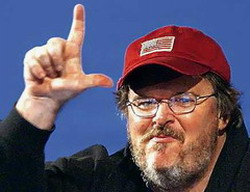Michael Moore and SiCKO are Welcomed in Havana
- Submitted by: admin
- Cinema
- International
- Health and Medicine
- 06 / 26 / 2007

"There's no doubt that a documentary by someone of Michael Moore's stature will help the world see the deeply humane principles of Cuban society", said Cubas Public Health Minister, José Ramón Balaguer, in an on-line forum. He stopped short, however, from involving Moore too much in light of his investigation by the US Treasury Department for allegedly violating the nearly half-century old blockade against the island nation.
Moore took a group of ailing 9-11 first responders to Cuba last March while he was shooting SiCKO. The destination was the U.S Guantánamo base health facility, the only universal health care provider in US territory according to Moore. But as they were not welcomed there, Moore sought help in Cuba and got it. In Havana, rescuers suffering from diseases caused by their work at Ground Zero in New York in September 2001 were provided, at almost no cost, the medical treatment they had been denied in the US.
"They didnt let me in at Guantánamo, and as I was in Cuba what else could I do? So I said to myself, let me take a look at the Cuban health care system and I saw that they have incredible assistance and excellent medical attention", said Moore in explanation.
In an attempt to silence ill-intentioned commentaries on a possible agreement between Moore and the Cuban government, Minister Balaguer was adamant that medical treatment provided to the group was not in exchange for publicizing Cubas internationally praised health standards.
The Cuba trip, however, has put Moore on the verge of being fined or imprisoned if the Treasury Department finds him guilty of breaking the US trade and travel restrictions on Cuba.
In a letter sent last May to Treasury Secretary Henry Paulson a few days after Moore was notified hes being investigated, the filmmaker demanded that the Bush Administration "immediately end this investigation and spend its time and resources trying to support some of the real heroes of 9/11".
Moore accused Republican congress members and presidential candidate-to-be Fred Thompson, the New York Post and right wing activists for using the Cuba trip to draw attention away from SiCKOs purpose: to call to action the people of the U.S. against the lucrative health care system in their country. "I understand why the Bush administration is coming after me -- I have tried to help the very people they refuse to help, but until George W. Bush outlaws helping your fellow man, I have broken no laws and I have nothing to hide".
SiCKO was premiered out of competition at Cannes Festival last May and was screened in Canada, where Moore sent a master copy of the movie as soon as he learned he was under investigation in order to preserve it in case the White House tries to confiscate it. People in the U.S. will have to wait until June 29th to watch SiCKO on the big screen, but Moore attracted their attention last week by showing some fragments on the Oprah Winfrey Show.
SiCKO is Moores tenth documentary since his debut in 1989 with "Roger and Me", which targeted the General Motors corporation. In 2002, his film "Bowling for Columbine" was awarded the 55th Cannes anniversary prize and the Oscar for best documentary. Two years later, Moore took the Palm DOr at Cannes for "Fahrenheit 9/11", an open attack on Bushs foreign policy.
Source: By Reina María Hernández, Cubanow
Comments